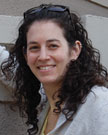 After a week that I really can’t explain, I got home to Tel Aviv around 6 a.m. on April 11, after visiting Poland to take part in the March of the Living. It was incredible. It was horrendous. It was life-changing, and parts with my group were even fun. I don’t know how to put into words what I saw, what I felt, what I experienced but will try.
After a week that I really can’t explain, I got home to Tel Aviv around 6 a.m. on April 11, after visiting Poland to take part in the March of the Living. It was incredible. It was horrendous. It was life-changing, and parts with my group were even fun. I don’t know how to put into words what I saw, what I felt, what I experienced but will try.
I am overwhelmed with emotions that I can’t make sense of. Ultimately I feel very blessed to be home, in my bed, in Israel. I feel proud to be a Jew in a generation that has always known a State of Israel and that those who need, have a place of refuge.
I feel disgusted by what I saw, ashamed at what was done by some and what was not done by others.
I am left confused about the nature of man by what he is capable of doing to others and also what man is capable of doing to survive.
I think of what they wore — threads barely put together and wooden shoes — as I stand in the freezing April air, not able to feel my fingers and it’s not even winter.
Of the 6 million Jews killed, I feel obligated to learn more stories ... because how many names do any of us really know? Anne Frank? Who else? Their names are in museums, but if I don’t remember, if we don’t remember their names and their stories, then they’re gone.
I feel blessed that no one I knew, no one of my family, went through these atrocities. Yet, simultaneously, I cannot understand how it happened; I cannot accept the realities, the horrors, the humiliation, the terror.
I am annoyed that more did not fight. I am frustrated that the mindset of the time was that Jews were weak and our people believed it and were brainwashed by the Germans that we deserved what happened to us.
I am frustrated that we did not protest enough when it all began. How did more not fight? How were more not willing to stand up even when waiting to enter the gas chambers or standing in line to be shot?
How did people live meters away from these camps and not do anything to stop what was going on?
Albert Einstein said, “The world is a dangerous place not because of those who do evil but because of those who look on and do nothing.” How true this is. How did they deny knowing what was going on? So many were willing to turn a deaf ear, a blind eye, or were actively indifferent. How?
I stood in front of a grave where 48 children were shot dead into a hole, like animals.
I stood in the field where Treblinka once stood, where some 1 million innocent lives were taken and now only snow covers the ground and stones placed in remembrance lay.
I walked from Auschwitz to Birkenau, a former death march for our brothers. But I was part of the March of the Living, my Israeli flag proudly wrapped around me, alongside thousands of others from all over the world.
I stood on the gravestones of named and unnamed persecuted souls singing “Hatikvah,” Israel’s national anthem.
I watched the faces of survivors, the tears that befell them.
A survivor fell to his knees, entering a room of collected shoes at Auschwitz, grabbing onto the glass case, moaning the names of his brother, his mother, his father … the family that he had lost.
This is what I saw, in part. This is what I felt, in part. It doesn’t begin to explain it all, and I don’t know if I ever will be able to understand what I just went through, to comprehend what really happened. I feel disconnected at times, which is probably a defense mechanism because a part of me does not want to allow myself to feel these emotions, unsure if I can handle the intensity of it all, not wanting to believe that it is real.
But it is real. It did happen. And we must remember.


